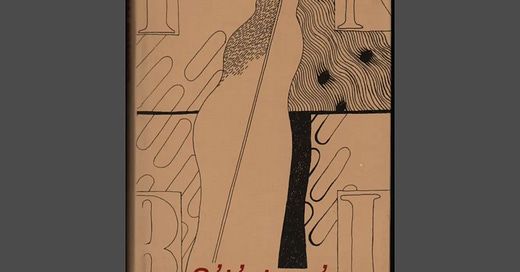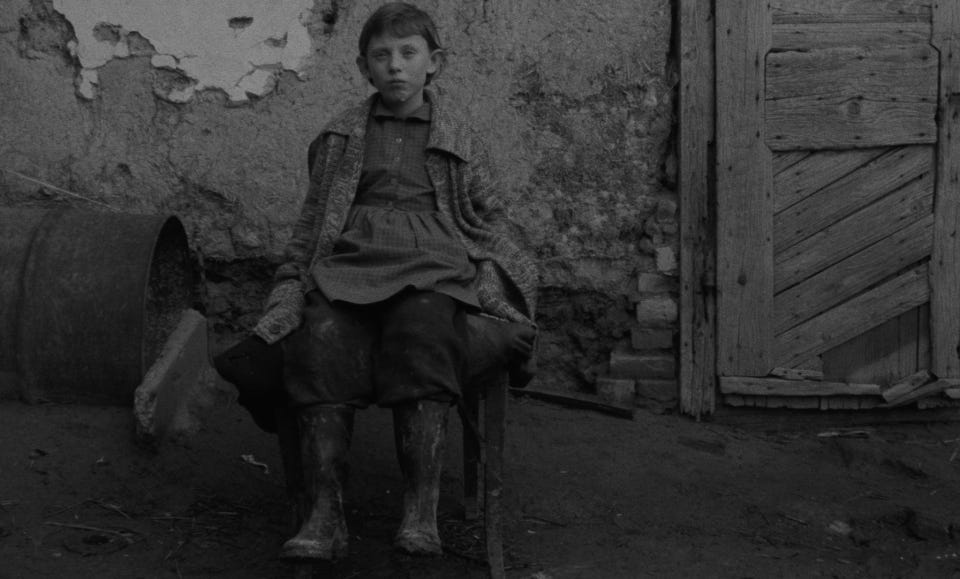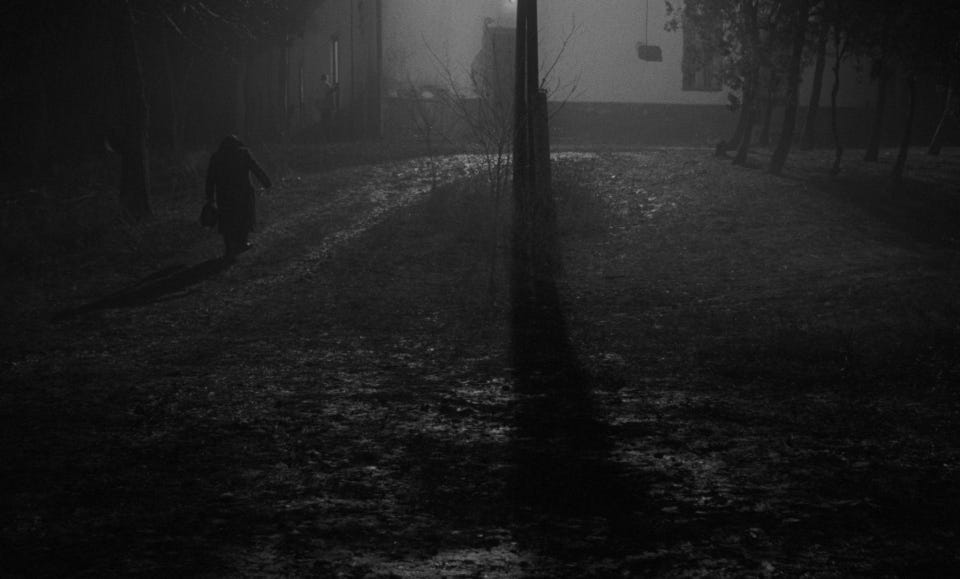Many thanks to all readers for helping Silent Friends reach 100 subscribers!
László Krasznahorkai. Satantango. Translated from the Hungarian by George Szirtes. New Directions, 2012 [1985]. 282 pp.
Much like the mysterious outsiders in Krasznahorkai’s fictions, or the tracking shots in the Béla Tarr films, this letter was a long time comin’.
As an earlier post said, Don László is one of our guys, and a series of letters working through the author’s main sequence of novels had been planned since the beginning of the Substack project. It was something I’d planned to do since the translation by Mulzet of Baron Wenkheim’s Homecoming was published way back in 2019, to say nothing of subsequent publications.
But the time has finally come to begin the (return) journey to LK’s world, starting of course with his big breakout debut Satantango — will this work hold up in the second dalliance with the devil? In short, it did.
Krasznahorkai began a literary career after a full course of study in law, like his father: by the 80s and 90s he was in full bohemian mode, rooming with an elderly Allen Ginsberg in New York, and traveling through the far east, which has heavily informed his later books.
Starting in the mid 90s, he collaborated as screenwriter with the modernist master of kino Béla Tarr, adapting a couple of LK’s books, as well as adapting Simenon’s The Man From London. They worked together all the way up to Tarr’s retirement in 2011. Krasznahorkai once said in your host’s presence that Tarr was a difficult and demanding artist to work with — you don’t really get that from the director’s work, though.
Being hailed by Sebald as a great novelist is probably as good as it got in the 80s for narrative literature. Indeed, the work still feels fresh. Maybe the elements are familiar from contemporaneous writers, like Sebald’s quasi-travelogue tone, or Bernhard’s orneriness; and there’s obvious influences from Dostoevsky and Kafka, as well as The Plague by Albert Camus. But the whole effect is uniquely intense and disturbing.
These brick-walled paragraphs relate the dim lives of the remaining members of a farming estate — a latifundia recently privatized after the end of socialism — in an advanced state of decay.
A club-footed guy name Futaki wakes up to the sound of bells from nowhere, and ruminates on this decline.
Suddenly there was a sour taste on his tongue and he thought it was death. Ever since the works had been split up, since people had been in as much of a rush to get away as they had been to come here, and since he — along with a few families, and the doctor and the headmaster who, like him, had nowhere else to go — had found himself unable to move, it had been the same, day after day, tasting the same narrow range of food, knowing that death meant getting used to, first the soup, then to the meat dishes, then, finally, to go on to consuming the very walls, chewing long laborious mouthfuls before swallowing, slowly sipping at the wine rarely enough set in front of him, or the water.
The world of Satantango contains basically everything that sucks about pastoral life: the poverty, the ignorance, religious fanaticism, selfish and shallow human beings, child abuse, mud-sodden paths, stinky animals, non-stop work, everything the same, nothing changing, until a catastrophe arrives…
And with such a small community, there’s surveillance, gossip, and judgment, like the reporting of the waggish “kid” Sanyi to his masters Irimiás and Petrina:
“…Mrs, Schmidt does it with the cripple, has for a long time, the headmaster does it to himself…Really repulsive…you can’t begin to imagine, ugh!…My sister has gone totally crazy, does nothing but listen and spy, she spies on everyone all the time, Ma beats her but it’s no use, nothing is of any use, it’s like people said, she will remain gaga all her life…believe or not, the doctor just sits at home all the time, doing nothing, absolutely nothing!”
There is a sort of formal analogy between the long lines of Krazsnahorkai and the long takes of Béla Tarr. Satantango the film might be the first literary adaptation whose running time (of 7.3 hours) matches the reading time for the book — a hardy experiment indeed.
But the Tarkovsky-like trance aesthetic of Tarr is very different from the racing clauses of LK’s prose.
From the perspective of film production, the arthouse long-take aesthetic that came out of the 70s is like a “religious” submission to the aesthetic itself. Every aspect of the mise en scene is devoted to the long take. The choreography is clocked down, actors kept at a distance, and if something goes wrong during the take you have to reset and start all over! At least editing the footage is pretty easy.
As for the unbroken paragraphs of Satango the novel, they don’t feel so rigorous: they race along, and this book is Krazsnahorkai at his most accessible.
It’s not like these “difficult” modernist forms were even that studiously employed for either artist. The scene with the police captain in the movie even has some conventional shot-reverse-shot business. In the novel, there are punchy lines like this: “He lets his words hang there for a moment, timelessly significant. They are like fossils cushioned by damp moss.”
During the sequence of carousing at the tavern (during which the young Estike is about to take her own life), we listen to Futaki dwelling on the estate’s situation once again:
First cold and ice, then foot-and-mouth disease with piles of dead sheep, then wages a week late because there wasn’t enough money to pay them,…though by the time it got to that state everyone was saying it was all over and that they’d have to close up shop. And that’s what happened. Those who had somewhere to go cleared off as fast as they could; those who didn’t stayed behind. And so began the quarrels, the arguments, the hopeless plans where everyone knew better than anyone else what should be done, or else pretended that nothing had happened. Eventually everyone was resigned to the sense of helplessness, hoping for miracles, watching the clock with ever greater anxiety counting the weeks and months until even time lost its importance and they sat around all day in the kitchen, getting a few pennies from here and there that they immediately drank away in the bar.
While stepping outside in the rain to take a leak, he thinks:
“We are born into this sty of a world…like pigs rolling in our own muck, with no idea what all that jostling at the teats amounts to, why we’re engaged in this perpetual hoof-to-hoof combat on the path that leads to the trough, or to our beds at dusk.”
If the world is a pigsty and the novel’s people are the pigs, the notion seems to be taken up when Irimiás gives a speech, upon the discovery of poor Estike.
And you know, when I think back over what I saw when we first arrived and crossed the threshold, the way you, my friends, were strewn across the room, dribbling, unconscious, slumped in chairs or over tables, your clothes in rags, covered in sweat, I must confess my heart aches and I become incapable of judging you, because that was a sight I shall never forget. I will recall it whenever anything threatens to deflect me from the mission with which God has entrusted me.
And the villagers obsequiously cringe under the leadership of this guy, thought to be dead, who comes to town with promises of hope and change. Is he a demagogue? The devil incarnate? Either way, you watch with ironic detachment these hopeless people and their desperate need for someone to tell them what to do. In the words of the police clerks who have to transcribe Irmias’s reports, it seems all one can say in response is something like, “ — you see! the latest, undoubtedly convincing evidence of the tragically rapid general decline.”
Readers of this sub likely don’t care that much about spoilers for novels, but a lot of things do happen in this work, not just the plots and capers, but the way they overlap, and with events replayed from a series of networked perspectives.
And at the very end, it turns out that the doctor — smoking and sipping pálinka while watching everyone else through the window like Jimmy Stewart, and keeping casefiles on everyone’s coming and going, like an ersatz federal agent — this man is the author of the text we’d been reading. (You know how doctors can be in these European communities, always knowing everything…)
But while resuming work on his case files, “suddenly his eyes brightened”: he realizes that the notes he’s been keeping are wrong, as if the only way to have true control or mastery of this drab world is to begin the sequence of prose, and thereby, “the circle closes.”





